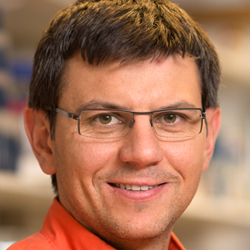The role of mitochondrial RNA modification in human disease
Research
Discovering the genetic links between mitochondrial dysfunction and human disease
In eukaryotic organisms almost all genetic information is encoded in DNA present in the nucleus of the cell, but a small DNA molecule inhabits mitochondria, cellular structures that provide energy from food for the cells to use. Mitochondrial DNA contains genes that are vital for the physiological functioning of the cell, and genetic defects causing dysfunction of mitochondrial DNA can lead to human diseases. We still do not know how mitochondrial genes work exactly.One of the ways to investigate the role of a gene, or to discover its biological function, it to change or disrupt DNA, and then to look for the effect on cultured cells, or on the whole organism. These methods of genetic modification are often powerful ways of studying disease genes encoded in the nucleus, but they cannot be applied to mammalian mitochondrial DNA. Also, many genes regulating mitochondrial function are still unknown. Therefore, our research goals are to identify new genes regulating mitochondria, define how these mitochondrial genes operate and to provide the technology to allow mammalian mitochondrial DNA to be modified genetically. It could be an invaluable way of understanding mitochondrial diseases and for advancing the quest for therapies.
Latest Publications
Van Haute L, Dietmann S, Kremer L, Hussain S, Pearce SF, Powell CA, Rorbach J, Lantaff R, Blanco S, Sauer S, Kotzaeridou U, Hoffmann GF, Memari Y, Kolb-Kokocinski A, Durbin R, Mayr JA, Frye M, Prokisch H, Minczuk M. (2016) Deficient methylation and formylation of mt-tRNA(Met) wobble cytosine in a patient carrying mutations in NSUN3. Nat Commun., 7:12039
Powell CA, Kopajtich R, D'Souza AR, Rorbach J, Kremer LS, Husain RA, Dallabona C, Donnini C, Alston CL, Griffin H, Pyle A, Chinnery PF, Strom TM, Meitinger T, Rodenburg RJ, Schottmann G, Schuelke M, Romain N, Haller RG, Ferrero I, Haack TB, Taylor RW, Prokisch H, Minczuk M. (2015) TRMT5 Mutations Cause a Defect in Post-transcriptional Modification of Mitochondrial tRNA Associated with Multiple Respiratory-Chain Deficiencies. Am J Hum Genet., 97(2):319-28
Rorbach J, Boesch P, Gammage PA, Nicholls TJ, Pearce SF, Patel D, Hauser A, Perocchi F, Minczuk M. (2014) MRM2 and MRM3 are involved in biogenesis of the large subunit of the mitochondrial ribosome. Mol Biol Cell, 17:2542-2555
Contact
Contact

MRC | Mitochondrial Biology Unit, University of Cambridge
Wellcome Trust/MRC Building, Cambridge Biomedical Campus, Hills Road
Cambridge, CB2 0XY, UK
Telephone +44-1223-252750
E-mail michal.minczuk(at)mrc-mbu.cam.ac.uk
Website
